 |
||
| . . . Chronicles . . . Topics . . . Repress . . . RSS . . . Loglist . . . | ||
|
|
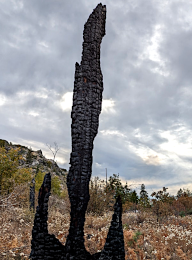
|
 |
|||||
| . . . 2023-01-29 | ||||||
November 5, 2022:
After dinner and dishwashing last night something happened, or stopped happening. I sat on the couch, feet curled under me for warmth, and couldn't think of a reason to move. I remembered that I usually read, or listened to music, or watched a movie, but I couldn't remember why. So I just stayed put until I recalled strongly enough that the ants that had swarmed into a kitchen cabinet were now gone and I could shift the roasting pans and colanders back again, and then I carefully stood up, carried the kitchenware into the kitchen, put on gloves, cleaned the ant traps out, and replaced the kitchenware. Then I walked back towards the living room and paused by one of the bookcases.I remembered having bought the books but I couldn't remember why and couldn't find any reason to keep walking, and so I stood more or less still until I became thirsty enough and sleepy enough to walk to my water glass and then to bed.
I don't know how well I slept last night, because it didn't matter. I lay there until it seemed inconvenient not to get up and eat the breakfast I'd prepared. I have some duties which I'll fulfill later today. But I still don't feel any need to read, or hear music, or contact anyone, or walk outdoors.
The vacancy isn't at all painful. Since I'm in less of a hurry I might cause less damage and trigger fewer disputes. It's definitely a change, though. Is this what normal people feel like, or is it just another way of being strange?
| . . . 2023-01-30 |
"And here's George in front of the Taj Mahal. I think they said it was the Taj Mahal."
Glass Onion (2022)
Believe me, I understand that puzzles aren't reality and puzzleworld isn't realism: before age twelve my favorite authors were Isaac Asimov and Ellery Queen. Even in puzzleworld you're generally allowed at most one identical twin or one bullet stopped by the Bible mother gave you but, OK, to some extent I can coast on the backwash of good will from Knives Out.
And I understand that Rian Johnson wanted to end with a comforting lie; god knows I was eager to be led down the garden path. But a steaming chin-high acre of unadulterated horseshit is not a garden path, and expecting us to swallow what you've shoved us into is not comforting.
If justice exists, it exists somewhere outside the puzzleworld. In such predicaments hard-boiled mysteries provided more satisfaction by admitting defeat, but that might harm the franchise.
(In all fairness, however, if you're among the millions of people who became convinced of the justice of the Taliban's cause immediately upon removal of those nasty Bamiyan statues, who divested from petrochemical corporations the day after soup splattered the Louvre, and who each year celebrate the memory of Herostratus, your reaction will differ.)
The Power of the Dog (2021)
In which Jane Campion successfully adapts an unfilmable property (not for the first time) and Benedict Cumberbatch embodies an Anglo-American masculine ideal which is instantly recognizable despite having, so far as I can recall, never before been shown: the embittered omnicompetent noble savage misogynous classicist gay cowboy bully — sort of a Natty Bumppo / Viscount Greystoke / Ethan Edwards / Achilles / Sir Richard Francis Burton type.
With fine sleight of hand, just around the time his and Kirsten Dunst's knock-'er-down-again-pa act becomes tiresome, it fades into the story simmering beneath it all along — the ancient struggle, sung so often by Patricia Highsmith, of father and son, homosocial macho and heterosocial sissy, John Wayne and Jimmy Stewart — and "Phil" (supply your own completion) learns that he should've worried less about Metamorphoses IV and more about Metamorphoses IX.
It Follows (2014)
As connoisseurs of mysterious ailments, we know that any disease which always kills its host and infects only one host at any time will not last long. Diseases don't work that way — but curses do.
What kind of curse? Obviously a zero-sum rational homo-economicus possession curse!
Demonic possession? Possession of the title to a 1958 Plymouth Fury? No, those aren't quite right....
In a sleepless hour later that night it finally came to mind: the curse of AIDS, which (authorities tell us) can only be lifted by raping a virgin. David Robert Mitchell's account even explains the otherwise inexplicable way that men tend to go ahead and die of AIDS despite their cure!
Surprisingly, none of the enthusiastic reviews I've seen bother to congratulate Mitchell on this insight.
Passing (2021)
An even closer adaptation than Canine Power, which must've won (I'm so confident that I'm not even going to look it up) a special Academy Award for Most Effective Faithful Realization of a Problematic Ending.
| . . . 2023-03-06 |
I'm probably as familiar with Jacobean literary history and Restoration literary history as the next guy, but, aside from bibliomantic consultations of Robert Herrick,1 I haven't spent much time with the literary history they sandwich. Dean Donne's hearse having dropped me off in Caroline London, I thought I might as well explore the neighborhood.
(If you'd like a serious, well-informed, useful description of the book, go to Colin Burrow.)
By far my favorite anthology is Jerome McGann's New Oxford Book of Romantic Period Verse. Not the most important or influential anthology,2 but my favorite, the one I most enjoyed reading straight through and the one I re-read most often — like a book rather than a sampler. Simply by ordering individual poems, regardless of author, by date of first publication, McGann gave music — or, to de-Paterize, an intuited structure whose medium is time — to the whole as well as its parts. Monotony is broken; potential contexts grow; conversations intended and imaginary liven the scene.
In and around the English Civil War, fewer of those conversations were imaginary: the mid-seventeenth-century was a peak of political-religious debate and polemic, with bewilderingly quick switches of side. And so Davidson rightly insisted that the period called for a more flexible structure than the standard Oxford Book of Whatever formula.
Unfortunately, his period can't support as elegant a solution as McGann's: much of the work was circulated in manuscript among an unknown number of readers for an unknown period of time before it reached print, much of it was anonymous or misleadingly credited, and so responses and counter-responses don't drop gracefully into either a by-date or by-author template.
Which forced Davidson into a hybrid approach, clumping poems roughly by topic, and by author (if known) within the clump. This works beautifully for the most contentious, most event-driven topics (spirituality, pre-war nostalgia, during-wars, and after-wars), and not so beautifully for the others. Reading a dozen gather-ye-rosebuds and whiter-than-lilies poems in close proximity may discourage bardolatry but it also numbs pleasure.
So... second favorite anthology, maybe?
Old-school (my-school) analyses/appreciations — nothing revolutionary, but amiable virtual company. It's fun to hear someone champion Thomas Carew and Henry Vaughan.
I enthusiastically recommend this book to anyone who's me but I'm not sure who else would like it.
For starters, putting "Marvell" in the title is like calling Anita Ekberg the star of La Dolce Vita. Marvell's high poetic reputation is a twentieth-century product and his prose only went on public display during the Restoration; he didn't leave much trace in the 1640s or early 1650s. Rather than dishing out 250 pages of wildassed speculation, McDowell's real topic is the community of cosmopolitan humanist intelligentsia during the Civil War(s). That does provide a probable context for Marvell, alongside other learned poets, but the center of that context and the true heroes of McDowell's account are the less canonical but more knowable Thomas Stanley and John Hall.
Hall is particularly attractive: a prodigy dead at 29 and mourned across partisan lines, who shifted political stances several times and openly admitted as much:
Perhaps thou art of an Opinion contrary to what is here written: I confesse that for a Time I myself was so too, till some Causes made me reflect with an impartial eie upon the Affairs of this new Government.
In a plea for Commonwealth support of arts and sciences, he linked his revolutionary intellectual goals with the regicidal Parliament in terms the Russian Futurists might've used:
What meanes were used before, for a bare historical knowledge, must now be turned into a censorious justice upon our old opinions, and into severe and eager disquisitions of new truths; for knowledge hath no limits nor Land-marks but being ubiquitary, and therefore desirous to diffuse it selfe, she endeavours by all means her promotion and dilatation. Nor doth she ever meet with any that would enlarge her Empire, but shee ambitiously encourages them, and willingly crownes them. Now for any one to thinke, that one and the same meanes are to be used to preserve a State, either new curdled and moulded into form, or else by outward violence retired to its last seat and almost first principles, and the same state when it hath overcome either its infancy or misery, and like a wakened Gyant begins to rowze it selfe up, and looke where it may conquer, is utterly unvers’d in the affaires of the world, and below instruction. [...] You that are men of sublime mindes, that have carried before you all the doubts and objections of flesh and blood, above the extent of your owne designs, or almost the latitude of your owne wishes, beyond the dictates of common Law and reason, will not give over while there remains so great a Worke. [...] What better meanes have you to confute all scandalls and imputations of your deadly adversaries, who have not spared to speake you worse then Goths and Vandalls, and the utter destroyers of all Civility and Literature, then by seriously composing your selves to the designe of cherishing of either. What director caus-way could you finde to the arrandization of your owne glory, then entertaining the celebrated care of so many kings, the onely splendour of so many Republicks, the life and lustre of so many Ages?
By taking Hall to exemplify the era's turned coats, so easily dismissed as time-serving hypocrites, McDowell suggests they were instead holding true to special interests which matched no official party line — liberty of thought, nonpartisan scholarship, free intellectual exchange — and their explicit allegiances might accordingly switch to whichever party seemed least dependent on either of those "forcers of conscience" (as Milton called them), the Counter-Reformation Catholic church and the theocratic Presbyterians. That is, they were "Royalists" or "Parliamentarians" or "Puritans" or "Independents" in the sense that, allowed a choice between a public-domain activist and the corporation-tender Dianne Feinstein, I might have been a "Republican" or "Green."
Davidson's and McDowell's books left me with a new enthusiasm for Richard Lovelace's later poems; references led me to Clarke's papers, which in turn led me to Clarke's Ph.D. dissertation.
Her stated goal was to demonstrate the sincerity of Lovelace's Royalism as expressed in his pre-Regicide verse. But, from my ignorant and amateurish viewpoint, those pages are the tail which wags the blue-medal hound of her first chapter: a no-nonsense scholarly biography of Lovelace which incorporates some impressive original research.
Davidson credits Potter's book as helping to justify his own, McDowell references it several times, and its title is certainly enticing.
And also a bit misleading; don't expect much in the way of Black Masses. What we actually have here is a top-notch academic fix-up which starts with a set of entertaining essays on topics relating to secrecy or deniability: deliberately ambiguous or misleading print provenance, genres à clef, literal ciphers, ....
The last two pieces are more of a conceptual stretch, and also the most substantial. (I felt an impulse to write "essential," but the book's too scarce for that to be fair. Maybe someday the Internet Archive will host a copy for digital lending, if the Internet Archive isn't sued out of existence.) Chapter 5, "The Royal Image," would make an excellent standalone guide to Charles I as a brand — the iconography; the dubious attributions — even if Susan Howe had to be excluded.
Most germane to my own secret rites, though, is chapter 4, "Intertextuality and Identity," whose insights apply about equally well to Andrew Marvell, Thomas Nashe, Lester Bangs, &c, &c:
What Nashe, Burton and the stage melancholic have in common is their learning, their wit, and a style which justifies its own self-indulgence on the grounds that it is either expressing or concealing mental disturbance, and is in any case a reflection of the madness of the times. As Taylor put it, in his attack on Wither, ‘Nonsence is Rebellion’. It is a style which creates a strong sense of personality, despite the fact that much of it is made up of other people’s words. [...]Is it possible that the mystifications of Sheppard and Marvell might be the ultimate secret code, one intended to keep them from understanding themselves? [...]
Drunkenness is a parody of the kinds of irrationality which the drinker really fears. What lies behind this language, I think, is the writer’s desire to escape responsibility for his own state. By depicting himself as ‘irrational’, in fact, he doubly escapes, because the irrationality itself is blamed on ‘the times’. His participation in a common world of images makes him typically rather than individually guilty.
1. "It says we should drink more wine."
2. The anthologies that most influenced me have been the usual bundles of selected-works (one to twenty or so per author), with authors arranged roughly by birth year or location. Stretching across my autodidactic life from, in adolescence, Oscar Williams's Master Poems of the English Language (with otherwise unattested portraits of "Percy Bysshe Shelley" and "John Keats" by "William Blake") to, most recently, Iain Sinclair's Conductors of Chaos, they've filled the role of academic mentor or literary community, helping me decide which writers to seek out next. But because (being slow-witted and having peculiar taste) I gain so much more from a writer's complete volumes than from judicious selections, once I've successfully sought those volumes, the initial anthology tends to dissolve into a scattering of otherwise unavailable singletons within a husk of redundant paper.
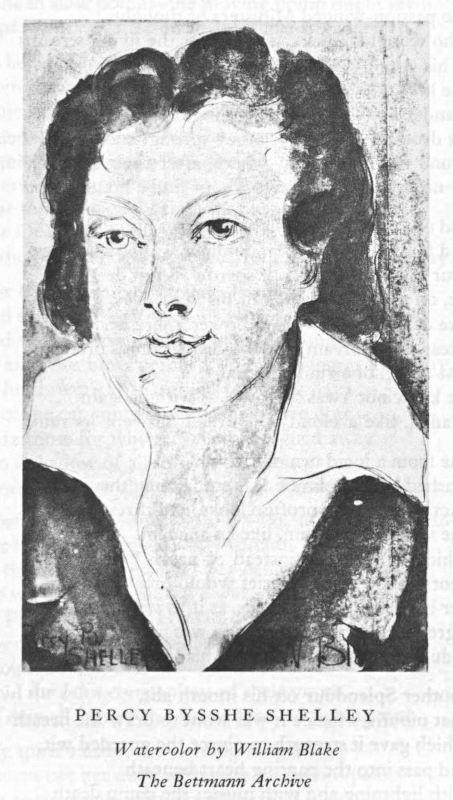
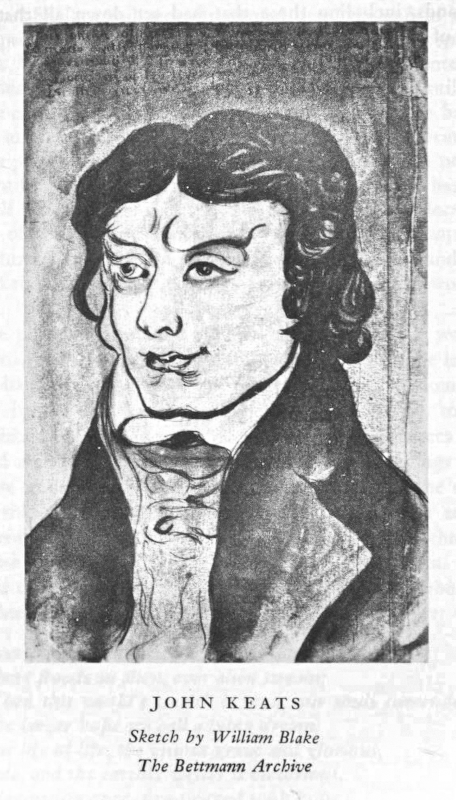
| . . . 2023-04-27 |
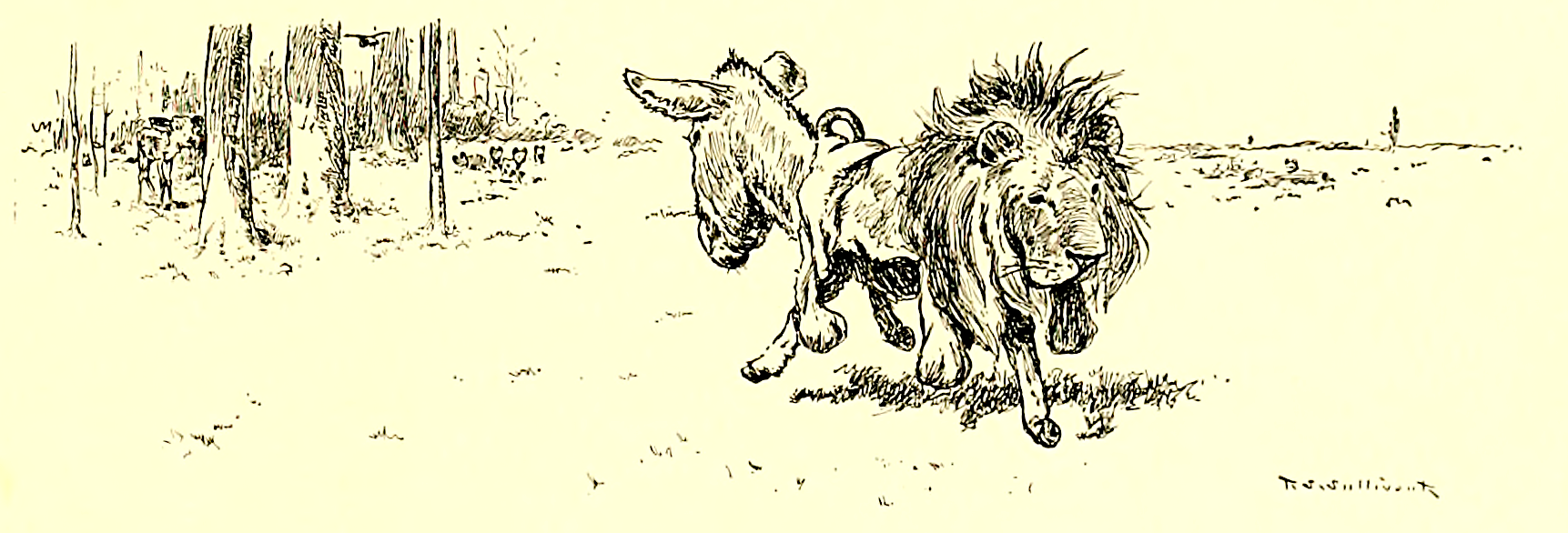
In youth, poetry and fancy prose styles were my best entertainment values. I didn't have to scrape up the cash for subscriptions consisting mostly of throwaway ads, or LP box sets and a constantly upgraded quadraphonic hi-fi system, or season seats in arenas or concert halls. I could lazily, at my own pace, check books out from the library, occasionally buy cheap paperbacks, and that was that.
Well, as the poet sang, "I ain't gonna be eighteen again, I know it." After the harrowing of browsable paper volumes from public library shelves, and the deforestation of used bookstores, and a series of copyright enclosures around any edition less than a century old, attaining a taste for poetry might be as expensive a prospect as it was in the years of parchment.
But wait! There's hope! Or at least an opportunity for massive corporations to leverage artificial scarcity to extract high profits from publicly funded institutions, which five out of five politicians agree is even better than hope. Ask your publicly funded institution about ProQuest LION (short for "Literature Online", in the sense of "Roach Motel"):
Right now, the subscription packages Proquest and Ebsco offer may sound like they cost a lot (between $500-$800,000 a year), but the price is “extremely low relative to the number of books acquired,” to quote the CSU report on the e-book pilot project.
The report understated its case. ProQuest doesn't merely acquire "primary texts"; it augments them. First it rips all the pages out of a book, discards some, and shuffles the rest. And then it defaces each past the point of easy readability. Imagine how much you'd have to pay a mob of Republican goons for that kind of service.
The damage is hardest on otherwise unavailable poetry, of course, but since I don't want mean old Mr. Hachette's gang coming after me I'll illustrate from the public domain: Stephen Crane's first collection of peculiar versicles, The Black Riders, and Other Lines.
The Hachetted Internet Archive still provides a facsimile of its 1905 edition:
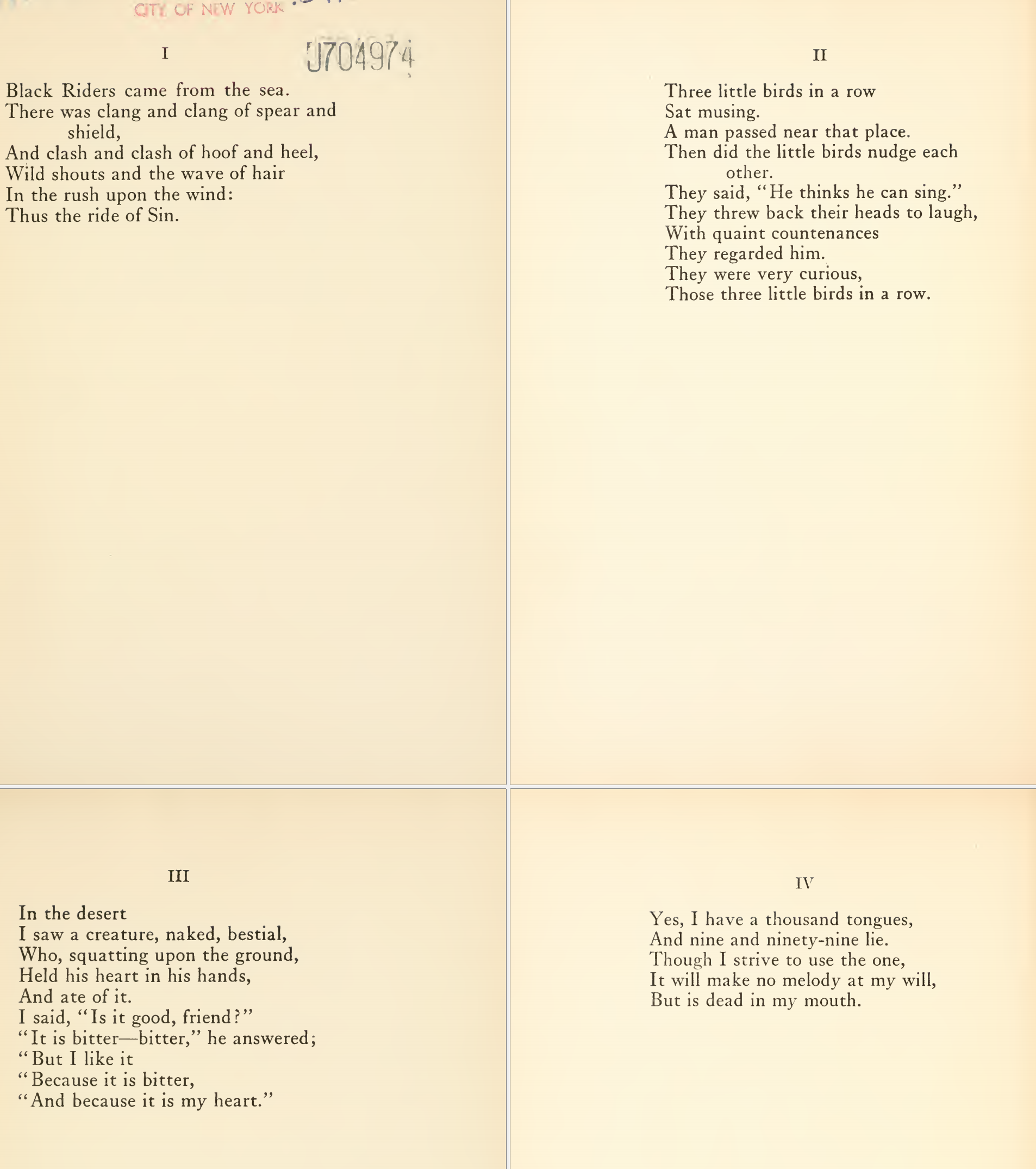
Project Gutenberg has well-OCRed HTML and EPUB versions:
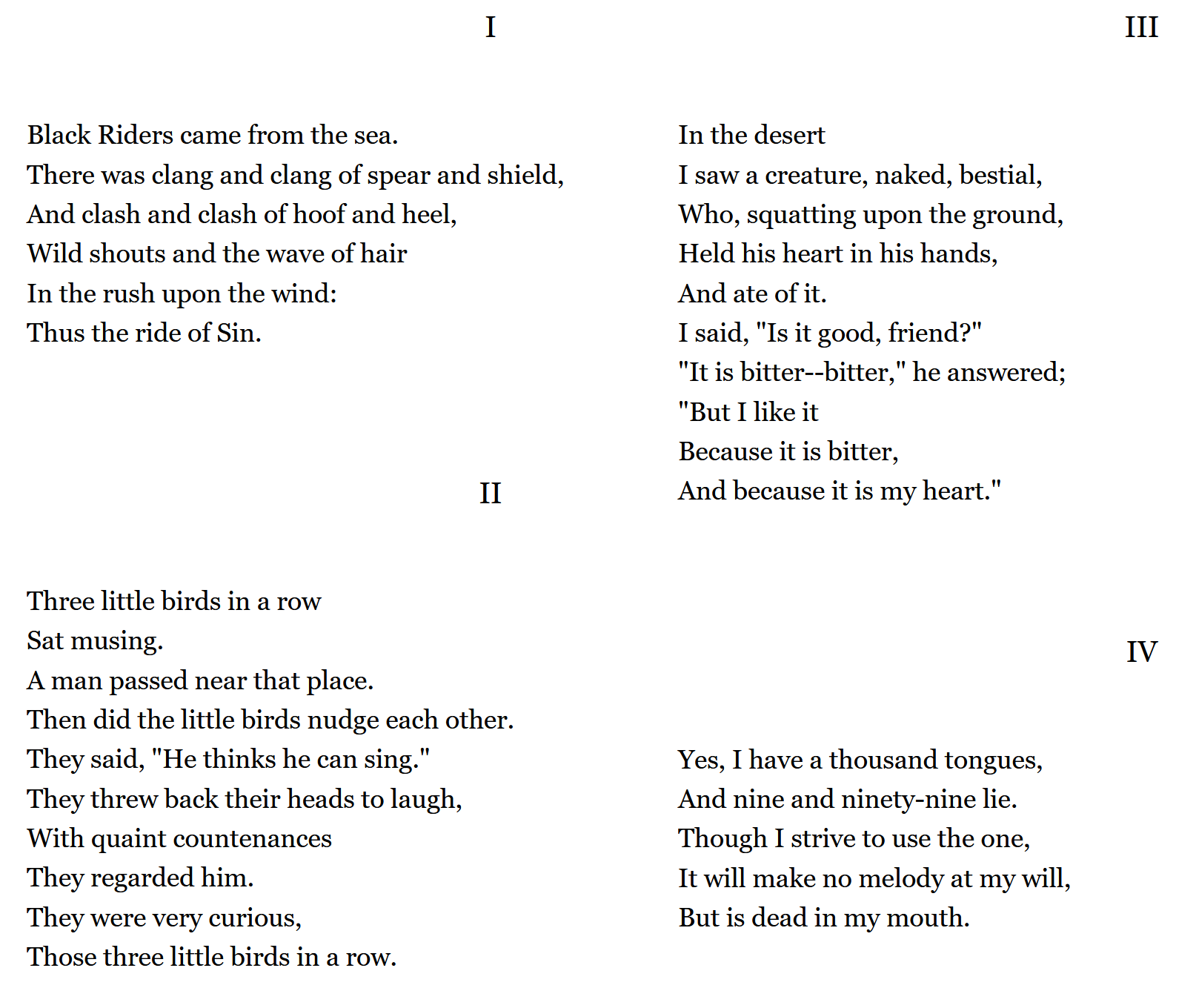
ProQuest sources the poems from a scholarly edition (shorn of all scholarly apparatus) but the contents match:
![Contents: 136 items, beginning with [I. Black riders came from the sea]](images/Proquest-Crane-contents.png)
So we just need to select the first batch, download a PDF, open it, and start reading:
![Huge gobs of boilerplate noise around number-prefixed verse sections, beginning with [XIX. A god in wrath]](images/Proquest-Crane-first-poems-in-PDF.png)
After many tries over many books, all I can make of ProQuest's ordering algorithm is that it resolutely ignores page numbers.
Line numbers, on the other hand! A Comp. Sci. major must've opened their Norton's anthology, seen familiar digits unobtrusively appended at a polite distance every five or ten lines, and decided those were the best parts. Words are afterthoughts.
ProQuest's save-&-export options include "Text only", which sounds promising but looks like so:
![Huge gobs of boilerplate noise around number-prefixed verse sections, beginning with [XIX. A god in wrath]](images/Proquest-Crane-first-poems-in-text.png)
Not much gained, except for gluing the title to the first line of verse.
To wax professional for a moment, there's no Javascript task more basic than toggling the visibility of a particular sort of text. And if memory serves me well, when I first encountered "LION" twenty-or-so years ago, a button was provided to remove those numbers. Nevertheless, at some point some unknowable dysfunctionary, presumably tasked with adding more boilerplate branding and fuckall else, learned it wasn't worth the effort.
Must be fun for screen-readers.
Now, I'm just a simple country boy who won a library card in a Bingo game, not a department head, nor an emeritus doctor of physic nor philosophy, nor a donor ripe for money-debagging. But maybe somewheres up thar in the whirly starry spheres, someone with actual influence actually gives a shit about getting something useful from their investment?
| . . . 2023-05-06 |
| . . . 2023-05-12 |
My most pleasant memory of "Elizabeth Episode II - The Empire Gives Up" is her performance as top sullen husk in this BBC production, a satirical documentary more scathing than its competition because none of its makers were in on the joke (video editor possibly excepted). If you're unsure whether to accept or refuse an O.B.E., the investiture sequence should decide you: a cross-section of British society as exhibited by Damien Hirst. Stay awake for a memorable cameo by America's own hollow rat-infested figurehead, Ronald Reagan.
(My most pleasant memory of its "Elizabeth II Fun Estate Sale" sequel is Kevin Boniface's characteristically brilliant "HM Queen Elizabeth Has Died".)
| . . . 2023-06-06 |
George Crabbe and Thomas Moore’s The Fudge Family in Paris (1818) are exponents of the same realistic tradition, but one that is applied with a new degree of perfection to narrative poetry. [...] Thomas Peacock’s Headlong Hall (1816) and Nightmare Abbey (1818) are also long narrative poems. As pastiches on the gothic novel, their satire relies on the presence of realistic detail. Peacock and the other poets show that realism and verisimilitude are not the same.— "James Joyce and the Middlebrow" by Wim Van Mierlo,
New Quotatoes: Joycean Exogenesis in the Digital Age
ed. Ronan Crowley & Dirk Van Hulle
| . . . 2023-06-16 |
Months of Dante reading left me in a conjunctive mood. But Gian Balsamo's rubber biscuit repulsed my age-brittled jaws, and while James Robinson's Joyce's Dante: Exile, Memory, and Community hit some exhilarating high points, the ratio of insight to overreach fell short of full satisfaction.
Instead, tops in Joycean reading this year was Andrew Gibson's The Strong Spirit: History, Politics, and Aesthetics in the Writings of James Joyce 1898-1915, a prequel to his fine twining of Ulysses with Irish politics, and even finer by dint of its longer duration, less familiar material, and triple-storied structure — Irish politics at the time Joyce wrote and Irish politics at the time of which Joyce writes, with Joyce's work to bind them — which counterintuitively made the recursive knots of Irish history easier to follow than a straightahead chronicle would. Garnish with fresh-ground peppery defenses of Stephen Dedalus's honor and Exile's worthiness.
Gibson's Exile chapter-and-championship delivered engaging history; still, I'm not yet willing to re-enter the turf-colored stale-urine-scented ditch of the play itself. But he did make me wonder how my reaction to A Portrait of the Artist as a Young Man might have changed since my last full reading, and how scholarship might have changed since my ancient used paperbacks of the novel and Don Gifford's Joyce Annotated were published.
The University of California libraries own no copy of the Gablerized edition, since it never appeared as an exorbitantly priced university press book. (For the same reason, they lack copies of the most interesting scholarly editions of The Way of All Flesh and Vanity Fair.) However, Jeri Johnson's post-Gabler notes for the 2000 Oxford paperback resolved a long-standing curiosity as to why Baby Tuckoo pronounced the "r" of "green" but not of "rose"; her introduction did me the further favor of pointing towards my even more ancient used paperback of James Joyce and the Making of Ulysses by Frank Budgen.
I'd come to think of the Budgen as one of those publications which exist largely to publicize and excerpt otherwise inaccessible work. Unfair! Budgen sustained a respectful but not sycophantic and almost comfortable friendship with Joyce longer than nearly anyone else managed, he supplied much of Joyce's most quoted table-talk, and, as Johnson says, his mini-Lacoön is suggestive and useful. In my instance, it usefully soothed my occasional wish that the streamlined-for-Bildungsroman stereotyping of Dedalus had been scuffed a bit by young Joyce's real-world athleticism and singing career: Rembrandt portrayed himself holding paintbrushes rarely, but canal-jumping never.
Joyce said to me once in Zürich:
"Some people who read my book, A Portrait of the Artist forget that it is called A Portrait of the Artist as a Young Man."
He underlined with his voice the last four words of the title. At first I thought I understood what he meant, but later on it occurred to me that he may have meant one of two things, or both. The emphasis may have indicated that he who wrote the book is no longer that young man, that through time and experience he has become a different person. Or it may have meant that he wrote the book looking backwards at the young man across a space of time as the landscape painter paints distant hills, looking at them through a cube of air-filled space, painting, that is to say, not that which is, but that which appears to be. Perhaps he meant both. However, it led me to ask myself if the writer, representing his own past life with words, is subject to the same limitations as the painter representing his physical appearance with paint on a flat surface. How near can each one get to the facts of his own particular case? Their limitations cannot of course be the same, but they are equivalent, and on the whole, the painter has the lighter handicap and is the likelier of the two to produce a true image of himself in his own material, although the extra difficulties that confront him are considerable. His first limitation is the inevitable mirror. The best of quicksilvered glass gives an image that is less true than an unreflected one, and the size of that image is by half smaller than it would be, were the same object standing where stands the mirror. He sees in the mirror a man holding in his left hand brushes and in his right hand a palette and he paints righthandedly this left-handed other self. Then he is fatally bound to paint himself painting himself. His functional, his trade self is in the foreground. The strained eye, the raised arm the crooked shoulder may be ingeniously disguised (they generally are) but something of objective truth gets lost in the process. And he is not only painting himself painting himself; he is also painting himself posing to himself. He is painter and model, too. The painter may be pure painter, but the model may be a bit of a poet or half an actor, and this individual will slyly present to his better half's unsuspecting eye something ironical, heroic or pathetic, according to the mood of the moment or the lifetime's habit. The limitation of viewpoint is obvious. The painter's two-dimensional mode of presentation limits him to one view of an object whatever he paints. He chooses that view and must abide by his choice. All that he can do is to convey the impression in painting one side of an object that the other side exists. In the case of any other object but himself he has at any rate the whole compass to choose from. He can walk round any other model but not round himself. So that, unless he resorts to one of those cabinet mirrors in which tailors humiliate us with the shameful back and side views of our bodies, he can see nothing of himself but full face and three-quarter profile. All this has to do merely with the getting to grips with what is usually called nature. The resulting picture, as all the galleries of Europe testify, may be as good as any other. Are there any Rembrandts we would change for the best self-portraits? One difficulty or limitation more or less among thousands is of no consequence.
And the writer's self-portrait? Goethe subtitled his own, Dichtung und Wahrheit. Did he mean that he consciously mixed fiction and fact to puzzle, delude or please, or did he mean that some Dichtung would be there by sleight of memory or because there were many true things better left unsaid? All the psychological inducements to fictify his portrait are present in greater measure for the writer than for the painter. A painter will rather paint the wart on his nose than the writer describe with perfect objectivity the wart on his character. All the posing that the painter does for himself the writer must do also. If he has a passion for confession he will exaggerate some element or other — make the wart too big or put it in the wrong place. He has his favourite role too — villain, hero or confidence man — and he would be more than human if he failed to act it. But, worst of all, his medium is not an active sense, but memory, and who knows when memory ceases to be memory and becomes imagination? No human memory has ever recorded the whole of the acts and thoughts of its possessor. Then why one thing more than another? Forgetting and remembering are creative agencies performing all kinds of tricks of selection, arrangement and adaptation. The record of a man's past is inside him and there he must look with the same constancy as the painter looks at his reflection in the mirror; only he is not looking at something (still less round something like a sculptor) but into something, like a mystic contemplating his navel. He can as little walk round his past life psychologically as the painter can walk round his reflected image. Between the moment of experiencing and the moment of recording there is an ever-widening gulf of time across which come rays of remembered things, like the rays of stars long since dead to the astronomer's sensitive plate. Their own original colours have been modified by the medium through which they passed. The "I" who records is the "I" who experienced, but he has grown or dwindled; in any case, he has changed. The continuous present of the painter is the writer's continuous past. No doubt, the most fervently naturalistic painter paints from memory, for there is a moment when he turns his eye away from the scene to his canvas and he must remember what he saw, but for practical purposes his time may be regarded as present time. Interpretation in material, words, pigment, clay, stone, is equivalent in all arts and all have the same aesthetic necessities. One other thing: if the writer cannot see the other side of himself, by a still more elementary disability he cannot see the outside of himself in action at all. He knows what he does as well as any, and why he does it better than any, but how he does it less than any.
Does he even, for example, know the sound of his own voice? If he is a singer he may, after long practice, get to know the sound of it when he is singing, but he will certainly not know how it sounds when he is arguing with a taxi driver. He knows the inside of himself and the outside of everybody else. He supplies other folk with his inner experiences and motives, and himself, by judgment and comparison, with the visible outward of their actions. The mimic among our friends will show the assembled company how we walk or talk. It seems strange and unbelievable to us, but from the laughter and "just like him"s of the others we know that it must be reasonably like. The essence, however, of this comparison is to show that all self-portraits, whether painted or written, are one-sided — that they are pictorial in character, not plastic.
Stephen Dedalus is the portrait and Bloom the all-round man. Bloom is son, father, husband, lover, friend, worker and citizen. He is at home and in exile. [...]
Rodin once called sculpture "le dessin de tous les côtés."; Leopold Bloom is sculpture in the Rodin sense. He is made of an infinite number of contours drawn from every conceivable angle. He is the social being in black clothes and the naked individual underneath them. All his actions are meticulously recorded. None is marked "Private." He does his allotted share in the economic life of the city and fulfils the obligations of citizen, husband and friend, his body functioning meanwhile according to the chemistry of human bodies. We see him as he appears to himself and as he exists in the minds of his wife, his friends and his fellow citizens. By the end of the 1day we know more about him than we know about any other character in fiction. They are all hemmed in in a niche of social architecture, but Bloom stands in the open and we can walk round him. [...]
His wife, Marion, is a onesidedly womanly woman.
— Frank Budgen, James Joyce and the Making of Ulysses
| . . . before . . . | . . . after . . . |
Copyright to contributed work and quoted correspondence remains with the original authors.
Public domain work remains in the public domain.
All other material: Copyright 2023 Ray Davis.